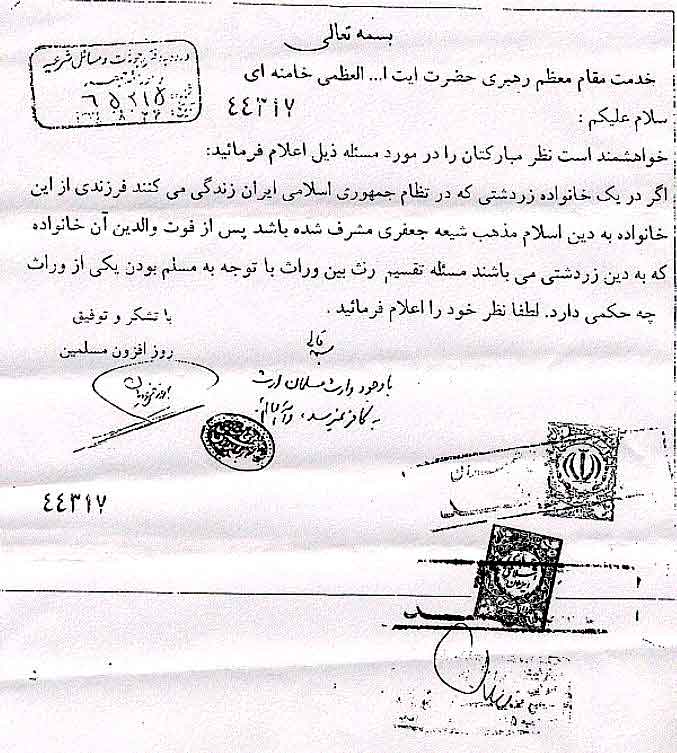A document that has profound implications for all religious minorities in Iran, including the Baha’i community of that nation, has come to light and is presented below in both its original version and a translation into English.
Following the explicit text of the Qur’an, Islamic law recognizes certain religions as the “People of the Book”. These groups are generally considered to be religions that appeared prior to Islam which possess a written sacred scripture. Islamic law specifically recognizes the Jewish, Christian and Zoroastrian religions to be in this category. This recognition is further reflected in Iran’s Constitution in which Article 13 states:
Zoroastrian, Jewish, and Christian Iranians are the only recognized religious minorities, who, within the limits of the law, are free to perform their religious rites and ceremonies, and to act according to their own canon in matters of personal affairs and religious education.
Furthermore, Article 64 of the aforesaid Constitution recognizes the right of Zoroastrians (along with Jewish and Christian communities) to have representatives in Iran’s Consultative Assembly (i.e. National Parliament):
(1) There are to be two hundred seventy members of the Islamic Consultative Assembly which, keeping in view social, political, geographic, and other similar factors, may increase by not more than twenty during each ten-year period from the date of the national referendum of the year 1368[1989-1990] of the solar Islamic calendar[sic – should be “Iranian” calendar – the Islamic calendar is lunar].
(2) The Zoroastrians and Jews will each elect one representative; Assyrian and Chaldean Christians will jointly elect one representative; Armenian Christians in the north and those in the south of the country will each elect one representative.
(3) The delimitation of the election constituencies and the number of representatives will be determined by law.
However, a recent verdict by Ayatollah Ali Khamenei, Iran’s Supreme Leader, appears to undermine both the text of the Qur’an and Iran’s constitution in this regard and may well be taken as an excuse for further narrowing the rights of all religious minorities, including the beleaguered Baha’i community. The verdict in question (appearing below) states:
In the Name of Most High
Submitted to the presence of the Supreme Leader, the illustrious Grand Ayatollah Khamenei, upon him be peace!
We request that you kindly proclaim your blessed view regarding the following matter:
If one of the children in a Zoroastrian family that lives under the rule of the Islamic Republic has converted to the Shiite Jafari creed of Islam, how would the division of estate take place after the passing of the parents who are Zoroastrian, in view of the fact that one of the inheritors is Muslim? Kindly make known your views.
[The following line is in Khamenei’s hand:]
With the presence of a Muslim inheritor, infidels [kafar] are barred from receiving an inheritance.
[Seal of Ayatollah Ali Khamenei and various religious agencies processing this verdict]
There are several aspects of this verdict that cause considerable concern. But perhaps the most alarming is the reference to Zoroastrians as kafar [infidels]. If Zoroastrians, who are clearly protected by both the text of Qur’an and Iran’s Constitution, can be referred to in such a language and be disenfranchised, what hope remains for the Baha’i community of that country?

October 21, 2008 10:06 pm
So the Constitution is nothing but a piece of paper…
I will post about this.
October 24, 2008 4:54 am
sad state of affairs. zoroastrians and bahai’is in iran should just emigrate to any other country! at least their next generation can preserve their culture.
no point in considering Iran to be your country when it dosent seem to understand your rights.
February 8, 2017 2:25 am
The Quran does not specify Zoroastrians as People of the Book. Listed are Jews, Christians and Sabeans. When Muslims conquered Iran, some leaders, facing an empire of Zoroastrians, accepted Zoroastrians as People of the Book (they have a scripture) for practical purposes. Intolerant individuals remember this and thus label Zoroastrians in insulting terms.